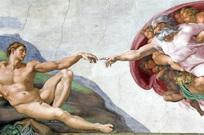|
The Heavens: Conscience or Cosmos? by Tami Jelinek Listen to Tami read this article here: 
We have been studying “the heavens” as a metaphor in Scripture for God’s people. More specifically, we have looked at examples of the phrase “the heavens and the earth” referring to God’s people in covenant relationship with Him. In the Old Heavens and Old Earth, “the heavens” refers to the guilty consciences of God’s people under the judgment of “the old earth,” or Old Covenant law. In the New Heavens and New Earth, “the heavens” refers to the cleansed, guilt-free consciences of God’s people under “the new earth,” or the New Covenant law of Christ. Please see Brian Maxwell’s article, The Heavens and the Earth, for a thorough study of how this metaphor is consistently repeated in Scripture. It is not my purpose to reiterate what has already been written; but rather after acknowledging the prevalence and consistency of “the heavens” as a reference to the hearts, minds, or consciences of God’s covenant community, it is my purpose to explore some significant ramifications of how we as Christians, and especially how we as preterists who acknowledge “the New Heavens and New Earth” as a present reality, understand the nature and scope of this New Creation.
At this juncture before continuing, I would simply like to stipulate to the fact that not every passage in Scripture where the words “earth,” “heaven” or “heavens” are used is to be understood metaphorically. We will be focusing here on passages with clear covenantal contexts and references. But there are certainly places where this language refers to elements of the cosmological creation, and the context usually makes this distinction plain. Sometimes we will encounter responses which amount to accusations that we are using shallow and sloppy exegesis, ignoring factors such as literary genre and context. These accusations are baseless and serve only to divert attention away from the focus of our study, which is the preeminence of Christ and His Kingdom in the Scripture. This is a spiritual Kingdom, or a Kingdom of conscience. “The New Heavens and New Earth” is synonymous with the “Kingdom of Heaven,” which is synonymous with the “New Creation.” Therefore, to globalize or universalize “the New Heavens and New Earth,” as many preterists do, is to deny its particular, exclusive and regenerated nature. In the study which follows we will see how this error has significant consequences to our theology, and more specifically, to the purity of the gospel. “If anyone is in Christ, he is a new creation.” The Heavens Are a People, Not a Place In many contexts, and with harmony and consistency throughout, Scripture uses the terms “heaven and earth,” or “the new heavens and the new earth”, as metaphorical references to God’s people in covenant relationship with Him. We believe the first occurrence of this reference is in Genesis 1:1: In the beginning, God created the heaven and the earth. Therefore it is our assertion that the creation story in Genesis is primarily about the creation of covenant, and does not directly refer to the creation of the physical cosmos. It does not refer to the biological beginning of the human race, but rather to the beginning of God’s covenant people and their history, which is the story of presence with God: once enjoyed in innocence; then lost through man’s transgression and its resulting guilt and shame; and finally and permanently restored through faith by Christ’s righteousness. Sometimes we may say, as Ward Fenley did in his article, Genesis: The Beginning of Time…or God’s People?, that “in the beginning” refers to the beginning of the Israelites. And we simply need to go to Paul for a reminder of who the Israelites are (and whom the nation of Israel in the Old Testament represents): Galatians 6:14 But may it never be that I would boast, except in the cross of our Lord Jesus Christ, through which the world has been crucified to me, and I to the world. 15 For neither is circumcision anything, nor uncircumcision, but a new creation. 16 And those who will walk by this rule, peace and mercy be upon them, and upon the Israel of God (NAS). Romans 2:28 For he is not a Jew who is one outwardly, nor is circumcision that which is outward in the flesh. 29 But he is a Jew who is one inwardly; and circumcision is that which is of the heart, by the Spirit, not by the letter; and his praise is not from men, but from God (NAS). But some will say in response (and this is a charge which has actually been voiced): “In your view, the Bible has nothing to say to Chinese people, so why would we preach the gospel to them?” Another distortion has been expressed this way: “If Genesis is about covenant creation, and not the creation of the world, then the god of the Bible is not the God of the universe, but merely a tribal god.” I hope the reader will see clearly that what has happened in both of these cases is that what we have expressed as a “covenant creation” has been arbitrarily redefined as a “local creation.” A spiritual creation has been given geographical boundaries. Furthermore, a spiritual new creation, in which there is neither Jew nor gentile according to the scriptures, has been erroneously defined not just spatially, but also racially. We reject both of these adulterations of God’s covenant creation. And as we shall see, they lead to some rather problematic theological ramifications. At the beginning of the Bible, the creation of “the heaven and the earth” refers to the beginning of God’s covenant relationship with His people. At the end of the Bible, the creation of “the new heavens and the new earth” refers to the restoration and renewal—the recreation or regeneration--of that covenant relationship. Neither the beginning of the Bible nor the end of the Bible refers to the creation of a geographic location or a biological race. It’s about a covenant people, not a cosmological race or place. The New Heavens Is The New Creation When I first began to study fulfilled eschatology, I would often hear from preterists this statement applied to difficult concepts like “the resurrection of the dead”: “Timing determines nature.” In other words, regardless of whether we have our understanding of the nature of these things worked out, regardless of how we define and explain the “resurrection” foretold by the prophets; the Bible is emphatically clear that it was fulfilled in the first century. The time statements are irrefutable. Either the Lord returned and the dead were raised incorruptible in the generation of “some who were standing there”, and who witnessed his death, burial and bodily resurrection; or He failed to keep His word and Christianity is a hoax. I was a bit frustrated with what I perceived as a lack of urgency toward defining the exact nature of these events. While I could not argue that the time statements did indeed prove fulfillment, I was not satisfied as some preterists seemed to be to merely leave it at that. I sensed that understanding the nature of the fulfilled Kingdom, or the New Heavens and New Earth, was of primary importance because to misunderstand it could lead to serious soteriological error. And that is exactly what is happening. Indeed, the timing of the New Creation may point us to a proper view of its nature; but more significantly, a proper view of the nature of the New Creation is essential to defining its scope. Recently a movement known as “Preterist Idealism” has emerged with the stated objective of refuting full preterism (to which we will henceforth refer as simply preterism). One of the most common charges idealism makes against preterism is that preterism, by definition, requires and ultimately concludes with universal atonement and universal redemption. Most preterists deny this logical necessity (and indeed most preterists are not universalists); and yet many of these same preterists teach that the New Heavens and New Earth is global and universal in its scope. In other words, they ‘physicalize’ and ‘spatialize’ the New Heavens and the New Earth. If this were indeed the case, I would have to agree with the idealist that preterism does indeed conclude with universalism. But Scripture is specific in its depiction of the New Heavens. These passages convince us beyond any doubt that "the heavens” of the New Creation must refer to God's own redeemed people, and cannot possibly be referring to the entire cosmological creation, or to all of humanity. The unredeemed do not reside in the New Heavens and New Earth where righteousness dwells (2 Peter 3:13). The unredeemed do not sing, for they are not comforted. Only the redeemed of the Lord praise Him for His mercy and salvation: Isaiah 44:23 Sing, O ye heavens; for the LORD hath done it: shout, ye lower parts of the earth: break forth into singing, ye mountains, O forest, and every tree therein: for the LORD hath redeemed Jacob, and glorified himself in Israel. Isaiah 49:13 Sing, O heavens; and be joyful, O earth; and break forth into singing, O mountains: for the LORD hath comforted his people, and will have mercy upon his afflicted. Psalm 19:1 The heavens declare the glory of God. Here the city of Jerusalem is equated with the New Creation where there are no more tears: Isaiah 65:17 For, behold, I create new heavens and a new earth: and the former shall not be remembered, nor come into mind. 18 But be ye glad and rejoice for ever in that which I create: for, behold, I create Jerusalem a rejoicing, and her people a joy. 19 And I will rejoice in Jerusalem, and joy in my people: and the voice of weeping shall be no more heard in her, nor the voice of crying. The former “heavens and earth” are not remembered in the New Jerusalem because the “former things” have passed away: Revelation 21:4 And God will wipe away every tear from their eyes; there shall be no more death, nor sorrow, nor crying. There shall be no more pain, for the former things have passed away." 5 Then He who sat on the throne said, "Behold, I make all things new." In the New Heavens and New Earth, the “former shall not come to mind;” in the New Jerusalem, ”the former things have passed away.” Therefore we conclude that these two are synonymous. Furthermore, all things are made new only for those in Christ. Only those in Christ are a new creation: 2 Corinthians 5:17 If anyone is in Christ, he is a new creation; old things have passed away; behold, all things have become new (NKJV). So we see that the New Heavens and New Earth is the New Creation in Christ. The New Creation is in fact defined by regeneration. Preterists who ascribe a universal scope to Christ’s New Creation (and invite the idealist’s charge of inevitable universal salvation) are committing one or perhaps both of two errors. They are either ‘physicalizing’ (by globalizing) the Kingdom of Heaven, which is antithetical to its biblically defined nature; or they are equating it with the age which began when heaven, God’s presence with His people, was opened by a “new and living way” (Hebrews 10:20). The New Heavens are God’s “made new” people and the New Earth is His New Covenant with them. However the New Heavens and New Earth is not the New Covenant Age. The New Covenant Age vs. The New Covenant Creation The assumption that the framework of preterism requires the equating of the New Covenant Age with the New Heavens and New Earth (New Covenant, or New Creation) is an erroneous assumption, without scriptural foundation. We reject this assumption, and this equation. This assumption is also the second of two major errors largely responsible for the “idealist” backlash against preterism. If the New Heavens and New Earth, which we maintain is synonymous with the Kingdom of Heaven, is equivocated with a period of time, then we must conclude that anyone living in this period of time is also living in Heaven. (Heaven forbid!) Now, ironically the idealist apparently maintains this equivocation of the Kingdom with the Age. Their solution for it, in order to avoid the obvious conclusion of universalism, is to esoterically (and without exegetical foundation) redefine the New Covenant Age as referring not to a period of time which began at a point in history, but as the salvation obtained by each individual, irrespective of their place in history, through faith in Christ. In order to do this however, they must completely remove both the fall and redemption from their historical contexts. This reduces the cross of Christ to a mere “outward show” of an eternally present spiritual reality—a salvation accomplished from eternity past, without the shedding of blood. It effectually places Old Testament believers in heaven, forgiven of their sins, before Christ died for them. It cannot be overstated just what a horrific suggestion this is. The idealist has gone to a lot of trouble to redefine age and remove redemption from history, effectually diminishing the significance and perhaps even removing the necessity of the cross, for no reason whatsoever. There is another solution to the apparent problem that all people everywhere currently are living in the same age (in other words, at the same time), and that is to realize that it presents no problem at all. We simply need to remove the erroneous equation of the New Covenant Age with the New Covenant Creation. From the very beginning, God established His covenant with a particular people. Ignoring this “covenant context” at any point in redemption’s history will lead to a misunderstanding and misapplication of God’s promises. Paul makes this clear: Galatians 3:16 Now to Abraham and his seed were the promises made. He saith not, And to seeds, as of many; but as of one, And to thy seed, which is Christ. Galatians 3:29 And if ye be Christ's, then are ye Abraham's seed, and heirs according to the promise. Gentiles who were once strangers to the covenants of promise became members of the commonwealth of Israel and partakers in its inheritance, through faith in Christ, and by His blood: Ephesians 2:8f For by grace are ye saved through faith; and that not of yourselves: it is the gift of God…11 Wherefore remember, that ye being in time past Gentiles in the flesh…12 That at that time ye were without Christ, being aliens from the commonwealth of Israel, and strangers from the covenants of promise, having no hope, and without God in the world: 13 But now in Christ Jesus ye who sometimes were far off are made nigh by the blood of Christ. It is essential that we recognize it is the cross of Christ which accomplished our salvation, and the merging together of believing Jew and gentile into one body: Ephesians 2:14 For he is our peace, who hath made both one, and hath broken down the middle wall of partition between us; 15 Having abolished in his flesh the enmity, even the law of commandments contained in ordinances; for to make in himself of twain one new man, so making peace; 16 And that he might reconcile both unto God in one body by the cross, having slain the enmity thereby: 17 And came and preached peace to you which were afar off, and to them that were nigh. 18 For through him we both have access by one Spirit unto the Father. 19 Now therefore ye are no more strangers and foreigners, but fellowcitizens with the saints, and of the household of God; In the previous age, salvation (the forgiveness of sins), though promised to God’s covenant people, had not been accomplished, because Christ had not yet performed it by the cross. Once Christ’s cross and subsequent high priestly ministry was finished, as signified by the destruction of the temple building, a new and living way was opened through the veil which had previously kept God’s people separated from His presence. That way was Christ’s flesh—His broken body offered as the sacrifice which perfected us forever: Hebrews 9:8f…the way into the sanctuary is not yet opened as long as the outer tent is still standing 9 (which is symbolic for the present age)…11 But when Christ appeared as a high priest of the good things that have come, then through the greater and more perfect tent (not made with hands, that is, not of this creation) 12 he entered once for all into the Holy Place, taking not the blood of goats and calves but his own blood, thus securing an eternal redemption (RSV). Hebrews10:14f For by one offering he hath perfected for ever them that are sanctified…19 therefore [we have] boldness to enter into the holiest by the blood of Jesus, 20 By a new and living way, which he hath consecrated for us, through the veil, that is to say, his flesh. The above excerpts from Hebrews 9 and 10 were chosen to highlight something very important regarding the New Covenant Age (what the New Testament calls "the age to come") which began at AD 70, as signified by the destruction of the temple and Jerusalem. There is nothing, absolutely nothing, in Scripture which suggests that to be living in the New Covenant Age is to be living in the New Covenant. The new age, by definition, is a new time. Since the beginning of this time, there is a new and living way opened, which forever more remains opened, by which we inherit the promises of the New Covenant, the forgiveness of our sins; and by which we enter the holiest of all, or heaven. That new and living way is Christ, and there is still only one way into Christ, and that is through faith. “If anyone is in Christ, he is a new creation.” It does not say, “If anyone was physically born after AD 70, he is a new creation.” Perhaps that sounds absurd, but isn’t that in effect what is being suggested by the equivocation of the New Heavens and New Earth (which we have already defined as the New Creation in Christ) with the post AD 70 era (or the New Covenant Age)? Eternal in the Heavens: The Forgetfulness of God Heavens and Earth: Conscience and Covenant. The difference between the old and the new is the difference between guilt and innocence; between rebuke and an unveiled face: Isaiah 25:7 And he will destroy in this mountain the face of the covering cast over all people, and the vail that is spread over all nations. 8 He will swallow up death in victory; and the Lord GOD will wipe away tears from off all faces; and the rebuke of his people shall he take away from off all the earth: for the LORD hath spoken it. 9 And it shall be said in that day, Lo, this is our God; we have waited for him, and he will save us: this is the LORD; we have waited for him, we will be glad and rejoice in his salvation. Under the Old Covenant, God’s people were guilty and ashamed, and their iniquities separated them from God’s presence, or His "face": Isaiah 64: 6 But we are all as an unclean thing, and all our righteousnesses are as filthy rags; and we all do fade as a leaf; and our iniquities, like the wind, have taken us away. 7 And there is none that calleth upon thy name, that stirreth up himself to take hold of thee: for thou hast hid thy face from us, and hast consumed us, because of our iniquities. David looked forward to the New Creation, when he would be resurrected with the likeness of Christ: Psalm 17:15 As for me, I will behold thy face in righteousness: I shall be satisfied, when I awake, with thy likeness. This he equated with heaven, and his one desire: Psalm 16:11 Thou wilt shew me the path of life: in thy presence is fulness of joy; at thy right hand there are pleasures for evermore. Psalm 27:4 One thing have I desired of the LORD, that will I seek after; that I may dwell in the house of the LORD all the days of my life, to behold the beauty of the LORD, and to enquire in his temple. The temple building made with hands was a symbol of the Old Covenant age; the holy of holies a copy of heaven. For as long as this building stood, the “regulations for worship” stood as a reminder that the way into heaven, or God’s presence, was not available, as the blood of animal sacrifices could not take away sin. In other words, they could never perfect the conscience of the worshipper: Hebrews 9:1f Now even the first covenant had regulations for worship and an earthly sanctuary…8 By this the Holy Spirit indicates that the way into the sanctuary is not yet opened as long as the outer tent is still standing 9 (which is symbolic for the present age). According to this arrangement, gifts and sacrifices are offered which cannot perfect the conscience of the worshiper, 10 but deal only with food and drink and various ablutions, regulations for the body imposed until the time of reformation. 11 But when Christ appeared as a high priest of the good things that have come, then through the greater and more perfect tent (not made with hands, that is, not of this creation) 12 he entered once for all into the Holy Place, taking not the blood of goats and calves but his own blood, thus securing an eternal redemption. 13 For if the sprinkling of defiled persons with the blood of goats and bulls and with the ashes of a heifer sanctifies for the purification of the flesh, 14 how much more shall the blood of Christ, who through the eternal Spirit offered himself without blemish to God, purify your conscience from dead works to serve the living God. Notice that the problem in verse 9 above (the inability of the blood of animal sacrifices of the regulatory temple worship to perfect the conscience) is solved in verse 14: the blood of Christ has purified our consciences. Jeremiah 51:10 The LORD hath brought forth our righteousness: come, and let us declare in Zion the work of the LORD our God. The “work” of God is His new creation. When we become a new creation in Christ, we become the righteousness of God (2 Corinthians 5: 17,21). We now are a building from God, eternal in the heavens: 2 Corinthians 5:1 For we know that if our earthly house of this tabernacle were dissolved, we have a building of God, an house not made with hands, eternal in the heavens. Many Christians see the above reference to the “earthly house” as our physical bodies. Therefore they view the contrasting “house not made with hands” as an individual “spiritual body” we will inhabit when our physical body dies. But consider this identical wording in Hebrews, and notice that it is contrasting the physical temple building which stood in Jerusalem as a symbol of the Old Covenant (and the holy place as a type of heaven), and heaven itself: Hebrews 9:24f For Christ is not entered into the holy places made with hands, which are the figures of the true; but into heaven itself, now to appear in the presence of God for us…he has appeared once for all at the end of the age to put away sin by the sacrifice of himself. He put away sin by His sacrifice. In other words, we have been perfected forever by His one offering (Hebrews 10:14). This is speaking of the purification of our conscience (Hebrews 9:14). In God’s eyes we are not guilty, because according to His New Covenant, which through the blood of Christ secured our eternal redemption (Hebrews 9:12), He does not remember our sin. This is the covenantal forgetfulness of God, eternally manifested in the heavens (the consciences of His people): Hebrews 8:10 For this is the covenant that I will make with the house of Israel after those days, saith the Lord; I will put my laws into their mind, and write them in their hearts: and I will be to them a God, and they shall be to me a people: 11 And they shall not teach every man his neighbour, and every man his brother, saying, Know the Lord: for all shall know me, from the least to the greatest. 12 For I will be merciful to their unrighteousness, and their sins and their iniquities will I remember no more. Sing, O ye heavens; for the LORD hath done it! |
Tami Jelinek 
Tami Jelinek is a part-time senior care giving coordinator and full-time seminarian, currently working toward her Master of Divinity degree. Tami and her husband of twenty-six years, Keith, reside in Auburn Hills, Michigan. They have three grown children. Tami’s personal passion is theology: the knowledge and experience of the Truth and Mercy found only in the person and work of Jesus Christ, and displayed in the lives and communion of His people. Exploring portraits of Christ and His kingdom in the Old Testament is the primary focus of her studies. Tami and Keith enjoy traveling, and love to fill their home with friends and family who share their fondness for good food, good wine, and great conversation.
Response from Tim Martin of Beyond Creation Science: Tami, Thank you very much for this article! Your distinction between the new covenant age (time period) and the new covenant creation (God's redeemed people) set off a brainstorm in my mind. This really clears up some loose ends that many struggle with today. It is amazing how just thinking consistently in terms of covenant relationship solves the problems inherent in views such as pret-idealism and pret-universalism. Your article is a real contribution to the development of the Covenant Creation view of Genesis. It is very exciting to watch more and more Christians begin to recognize Genesis as gospel proclamation, matching the final chapters of Revelation. Keep up the good work! Blessings, Tim Martin Related Articles: |


